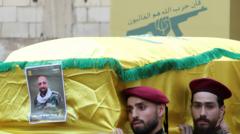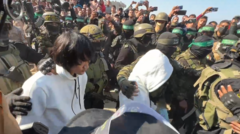The shocking disclosures have raised serious ethical concerns and triggered international outcry over the methods employed during a recent spate of violence.
**Revelations on Israel's Covert Tactical Strikes Against Hezbollah**

**Revelations on Israel's Covert Tactical Strikes Against Hezbollah**
Former Israeli agents disclose the intricate details of a decade-long operation using explosive devices concealed within communications equipment.
Two former Israeli intelligence operatives, speaking with US CBS News, have detailed a ten-year-long covert operation aimed at destabilizing Hezbollah through the use of modified Israeli walkie-talkies and pagers. The shocking tactic resulted in numerous fatalities and injuries during a sudden wave of attacks across Lebanon on September 17, 2024, leading to widespread chaos and fear.
According to the agents, who identified themselves as Michael and Gabriel, the Israeli intelligence agency Mossad successfully tricked Hezbollah into purchasing over 16,000 rigged walkie-talkies, which had concealed explosive devices within their batteries. Michael explained that the devices were strategically placed to maximize the threat to users, while minimizing collateral damage. "We designed these devices such that they only posed a risk to the intended targets," he stated, emphasizing the precision and care taken in their planning.
The operation intensified in 2022 when Mossad discovered Hezbollah's dependence on pagers produced by a Taiwanese company. Employing a façade of legitimate enterprise, they created a fake business to produce counterfeit pagers rigged to explode when activated remotely from Israel. Each pager was designed to emit an urgent ringtone to prompt users to check incoming messages, unwittingly triggering the explosive device.
Hezbollah reportedly acquired around 5,000 of these devices by September 2024, setting the stage for a coordinated offensive that resulted in simultaneous explosions across strongholds inhabited by the group. The aftermath saw countless casualties and extensive damage, with hospitals overwhelmed by an influx of injured individuals.
The international community quickly condemned these tactics, with UN Human Rights Chief Volker Turk labeling the attacks as potential war crimes. He expressed his dismay, stating that the methodology of such strikes fundamentally contravenes international humanitarian law and poses serious ethical challenges.
As Israel's airstrikes against Hezbollah escalated following the attacks, the scale of the conflict intensified, with both parties eventually agreeing to a ceasefire on November 26. Amidst the growing tensions, these revelations bring to light the complexities and moral dilemmas shaping modern warfare.
According to the agents, who identified themselves as Michael and Gabriel, the Israeli intelligence agency Mossad successfully tricked Hezbollah into purchasing over 16,000 rigged walkie-talkies, which had concealed explosive devices within their batteries. Michael explained that the devices were strategically placed to maximize the threat to users, while minimizing collateral damage. "We designed these devices such that they only posed a risk to the intended targets," he stated, emphasizing the precision and care taken in their planning.
The operation intensified in 2022 when Mossad discovered Hezbollah's dependence on pagers produced by a Taiwanese company. Employing a façade of legitimate enterprise, they created a fake business to produce counterfeit pagers rigged to explode when activated remotely from Israel. Each pager was designed to emit an urgent ringtone to prompt users to check incoming messages, unwittingly triggering the explosive device.
Hezbollah reportedly acquired around 5,000 of these devices by September 2024, setting the stage for a coordinated offensive that resulted in simultaneous explosions across strongholds inhabited by the group. The aftermath saw countless casualties and extensive damage, with hospitals overwhelmed by an influx of injured individuals.
The international community quickly condemned these tactics, with UN Human Rights Chief Volker Turk labeling the attacks as potential war crimes. He expressed his dismay, stating that the methodology of such strikes fundamentally contravenes international humanitarian law and poses serious ethical challenges.
As Israel's airstrikes against Hezbollah escalated following the attacks, the scale of the conflict intensified, with both parties eventually agreeing to a ceasefire on November 26. Amidst the growing tensions, these revelations bring to light the complexities and moral dilemmas shaping modern warfare.























